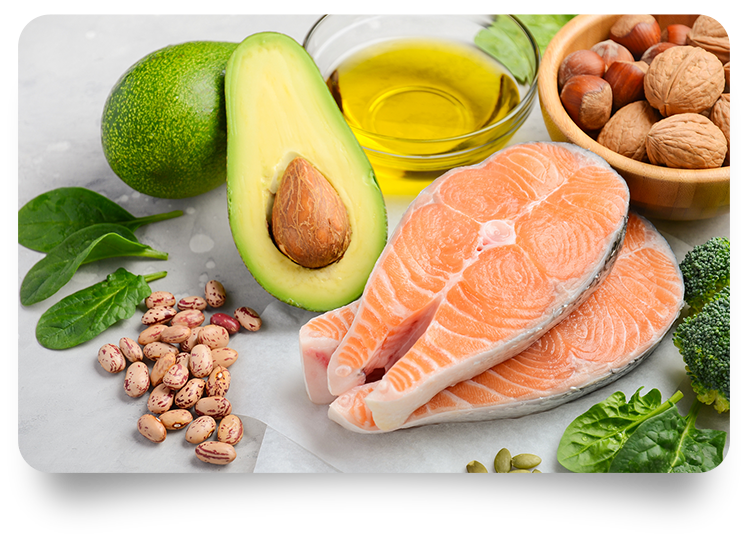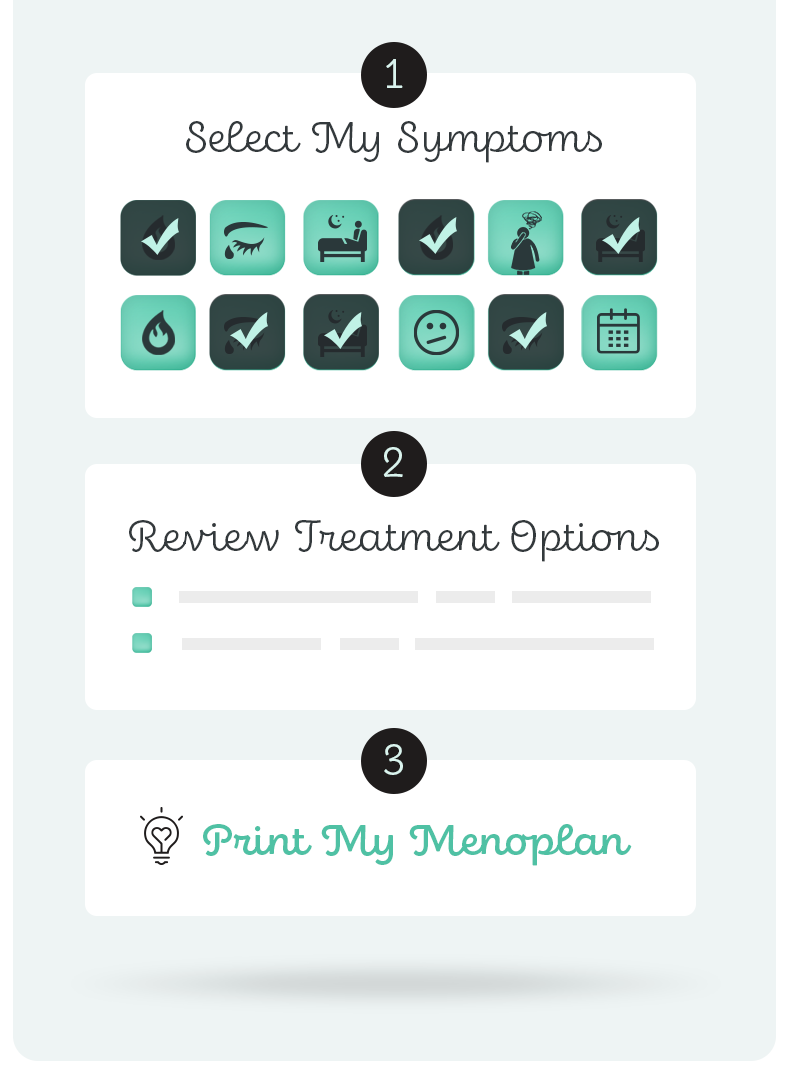Treatments
WHAT IS IT?
Omega-3 fatty acids are fats found in foods. Your body cannot produce them. They are found in fatty fish, fish oils, flax seeds, chia seeds, flaxseed oil and walnuts. They can be taken in dietary supplements (pills), but may not be absorbed as well as eating foods rich in omega-3 fatty acids.
Eating a diet rich in omega-3s has been found to be good for your heart. By and large, however, it does not help with symptoms of menopause.
OUR BOTTOM LINE, DOES IT HELP?
MAYBE. There is some research to indicate omega-3 fatty acids may help with dry eye.
NO. Overall we do not recommend using omega-3 fatty acids to relieve other menopausal symptoms.

DRY EYE
There is research to show that omega 3 fatty acids may be helpful with dry eye. A recent study found that it did not help when compared to a placebo pill containing olive oil. Since a diet rich in olive oil may also be good for your eyes, more research is needed to sort it out.

HOT FLASHES AND NIGHT SWEATS
Though they do have other health benefits, there is strong evidence that Omega-3 fatty acids do not improve hot flash frequency, severity, interference, or menopause-related quality of life.

SLEEP PROBLEMS AND INSOMNIA
Omega-3 fatty acids do not help with sleep problems.

PAIN WITH SEX
Omega-3 fatty acids do not help with pain with sex.

LOW SEX DRIVE
Omega-3 fatty acids do not help with low sex drive.

VAGINAL PAIN OR DRYNESS NOT DURING SEX
Omega-3 fatty acids do not help with vaginal pain or dryness not during sex.
POTENTIAL RISKS & SIDE EFFECTS
Omega-3 supplements can have mild side effects that include unpleasant taste, bad breath, bad-smelling sweat, headache, and gastrointestinal symptoms such as heartburn, nausea, and diarrhea.
High doses of omega-3 supplements may interact with drugs that affect blood clotting. If you are on a drug that affects clotting consult your health care provider before taking omega 3 supplements.
It is not known if it is safe for people with seafood allergies to take fish oil supplements
QUALITY OF LIFE EXPECTATIONS
Omega-3 fatty acids do not improve menopause related quality of life.
IF I WANT TO TRY THIS TREATMENT WHAT ARE MY NEXT STEPS?
Try to eat fish several times a week and eat other foods high in omega-3 fatty acids. As for supplements, more research is needed to know what formulation is best for dry eyes. If you want to consider using omega-3s for you heart, check out this information from the National Institutes of Health.
Ciappolino V, Mazzocchi A, Enrico P, et al. N-3 Polyunsatured Fatty Acids in Menopausal Transition: A Systematic Review of Depressive and Cognitive Disorders with Accompanying Vasomotor Symptoms. Int J Mol Sci. 2018;19(7):1849. Published 2018 Jun 23. doi:10.3390/ijms19071849
Cohen LS, Joffe H, Guthrie KA, Ensrud KE, Freeman M, Carpenter JS, Learman LA, Newton KM, Reed SD, Manson JE, Sternfeld B, Caan B, Freeman EW, LaCroix AZ, Tinker LF, Booth-Laforce C, Larson JC, Anderson GL. Efficacy of omega-3 for vasomotor symptoms treatment: a randomized controlled trial. Menopause. 2014;21(4):347-354. doi:10.1097/GME.0b013e31829e40b8. PMID:23982113 Free PMC Article
Downie LE, Ng SM, Lindsley KB, Akpek EK. Omega-3 and omega-6 polyunsaturated fatty acids for dry eye disease. Cochrane Database Syst Rev. 2019 Dec 18;12(12):CD011016. doi: 10.1002/14651858.CD011016.pub2. PMID: 31847055; PMCID: PMC6917524.
Freeman MP, Hibbeln JR, Silver M, Hirschberg AM, Wang B, Yule AM, Petrillo LF, Pascuillo E, Economou NI, Joffe H, Cohen LS. Omega-3 fatty acids for major depressive disorder associated with the menopausal transition: a preliminary open trial. Menopause. 2011;18(3):279-284. doi:10.1097/gme.0b013e3181f2ea2e. PMID:21037490 Free PMC Article
“Office of Dietary Supplements – Omega-3 Fatty Acids.” NIH Office of Dietary Supplements, U.S. Department of Health and Human Services, 17 Oct. 2019, https://ods.od.nih.gov/factsheets/Omega3FattyAcids-HealthProfessional/.
“Omega-3 Supplements: In Depth.” National Center for Complementary and Integrative Health, U.S. Department of Health and Human Services, May 2018, www.nccih.nih.gov/health/omega3-supplements-in-depth. https://nccih.nih.gov/health/omega3/introduction.htm
Reed SD, Guthrie KA, Newton KM, Anderson GL, Booth-LaForce C, Caan B, Carpenter JS, Cohen LS, Dunn AL, Ensrud KE, Freeman EW, Hunt JR, Joffe H, Larson JC, Learman LA, Rothenberg R, Seguin RA, Sherman KJ, Sternfeld BS, LaCroix AZ. Menopausal quality of life: RCT of yoga, exercise, and omega-3 supplements. Am J Obstet Gynecol. 2014;210(3):244.e1-244.e11. doi:10.1016/j.ajog.2013.11.016. PMID: 24215858 Free PMC Article
Sánchez-Borrego R, von Schacky C, Osorio MJA, Llaneza P, Pinto X, Losa F, Navarro MC, Lubián D, Mendoza N. Recommendations of the Spanish Menopause Society on the consumption of omega-3 polyunsaturated fatty acids by postmenopausal women. Maturitas. 2017;103:71-77. doi:10.1016/j.maturitas.2017.06.028. PMID: 28778336
Authors: Dr. Katherine Newton, & Dr. Leslie Snyder. Last reviewed February 15, 2021



